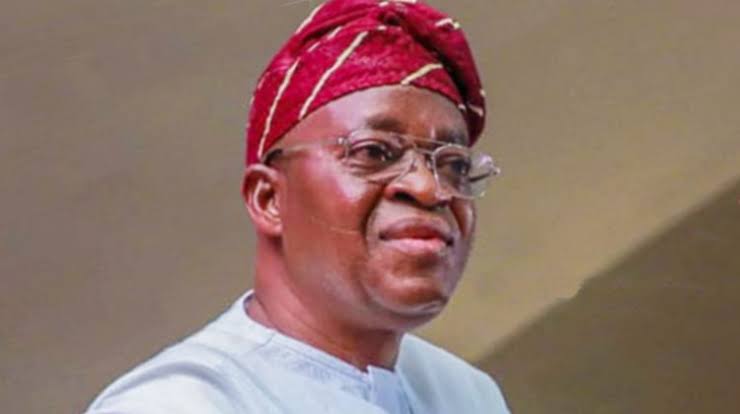The Minister of Marine and Blue Economy, Adegboyega Oyetola, has called on African nations to take a leading role in the decarbonisation of the global shipping industry.
Speaking at the African Strategic Summit on Shipping Decarbonisation held in Abuja, Oyetola urged stakeholders to move beyond discussions and implement concrete solutions that will ensure Africa’s maritime sector remains competitive in a rapidly changing global economy.
He said, “It is my profound honour to welcome you all to the first African Strategic Summit on Shipping Decarbonisation, which is the convening of visionary leaders, policymakers, and industry practitioners dedicated to shaping the future of Africa’s maritime industry. Today, we gather not just to discuss challenges but to forge solutions that will propel Africa towards a sustainable and prosperous blue economy.”
The minister emphasised that the global shipping industry is at a pivotal moment as the International Maritime Organisation moves forward with its Revised Greenhouse Gas Emissions Reduction Strategy and other midterm measures to combat climate change.
He explained, “With over 90% of global trade facilitated by maritime transport, reducing GHG emissions from shipping is not just an environmental necessity but an economic imperative. Africa must ensure that its voice is heard and its interests safeguarded in shaping policies that impact our economies and livelihoods.”
The former Osun State governor highlighted that Africa, with 38 coastal nations, has a rare opportunity to benefit from the global energy transition, but only if it approaches the process strategically.
He said, “Africa has a rare privilege to explore opportunities that this energy transition offers our region by engaging in meaningful discussions and collaborations that do not set us back to extractive partnerships but a respectful approach to building our region and strengthening our position in the world. This will not come easy, and that is the essence of this summit.”
He noted that the African maritime sector is strategically positioned to leverage its geographic advantage, renewable energy potential, and expanding port infrastructure to become a leader in green shipping.
“Decarbonising the shipping industry must be pursued in a manner that is just and equitable, ensuring that no African nation is left behind,” he advised.
The minister also stressed that decarbonisation is not just about ships but involves multiple sectors, including transport, environment, climate change, trade, and investment. He called for a fair revenue distribution from global decarbonisation policies, with funds reinvested in Africa’s maritime infrastructure, alternative fuel research, and workforce capacity building.
“Here is a platform for Africa to solidify its position and advocate policy mechanisms that ensure fair revenue distribution from global decarbonisation measures. The funds generated should be reinvested into African maritime infrastructures, alternative fuel research, and capacity building for its workforce to build a resilient and competitive shipping industry,” he asserted.
Oyetola acknowledged the role of the Lead Afrocentric Project in providing research and policy recommendations for African nations at the IMO. He urged further institutionalising of technical expertise to ensure Africa is an active participant in shaping global maritime decarbonisation policies.
“By leveraging the current LEAP Project’s successes and institutionalising technical expertise through Professional Technical Network and Advisory, we can ensure that Africa moves forward not only as an observer but also as an active participant in shaping global maritime decarbonisation policies,” he explained.
The minister outlined key areas where Africa can take a leading role in green shipping solutions, including renewable energy-powered ports by integrating wind, solar, and hydrogen power into port infrastructure. He also emphasised the establishment of green corridors, which would create decarbonised shipping routes across the continent.
He highlighted the importance of maritime workforce development, ensuring a transition to zero or near-zero emission technologies, and stressed the need for African ship ownership, calling for support and incentives for domestic ship owners.
During his speech, Oyetola announced that Nigeria will be bidding for Category ‘C’ of the IMO Council in the upcoming November/December 2025 elections.
He warned that the current pace of negotiations and research suggests that Africa and other developing nations bear the highest transport cost burden due to the transition to zero-emission shipping, insisting that Africa must move from being passive recipients of global policies to active decision-makers.
“You may wish to note that the time for Africa to take the helm of its maritime future is now. We must shift from being passive recipients of global policies that do not reflect our peculiar circumstances,” he charged.
The minister urged participants to collaborate strategically to secure Africa’s place in the future of global shipping.
“As we deliberate over the next two days, I urge each of us to think boldly, act decisively, and collaborate strategically. Together, we can shape an African maritime future that is greener, more inclusive, more prosperous, and, more importantly, largely on our own collective terms,” he said.
Also speaking, the CEO of the Nigerian Maritime Administration and Safety Agency, Dayo Mobereola, said, “Shipping decarbonisation is the effort to reduce greenhouse gas emissions from the shipping industry. It is a significant contributor to global emissions. The shipping industry accounts for approximately three per cent of global GHG emissions contributing to climate change. The environmental concerns arising from these emissions have created a sense of urgency, driving the world to focus on shipping decarbonisation—and Africa must not be left behind.”
Also speaking, the principal investigator of the LEAP project, Dola Oluteye, stated that while shipping is the backbone of global trade, it also significantly contributes to carbon pollution, which is why global efforts are focused on decarbonisation.















